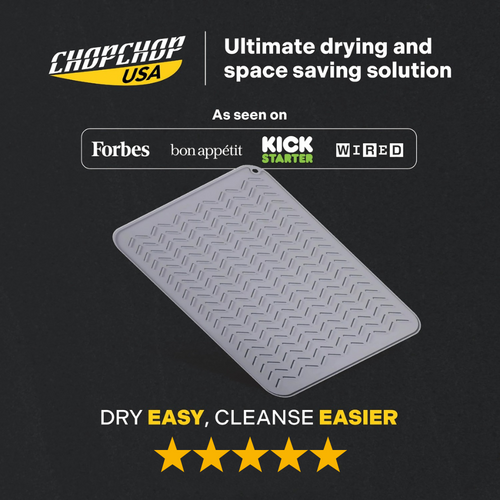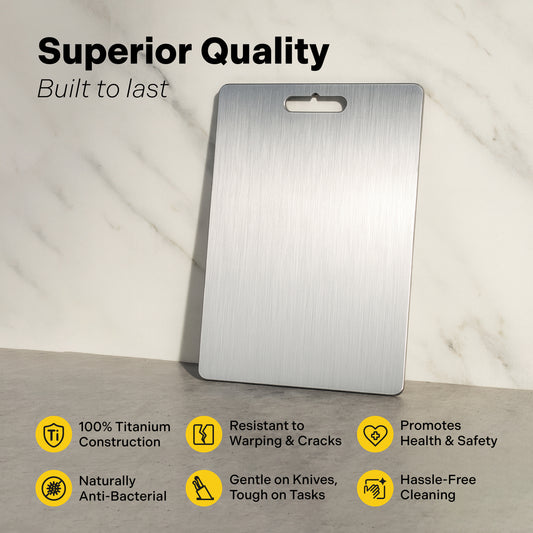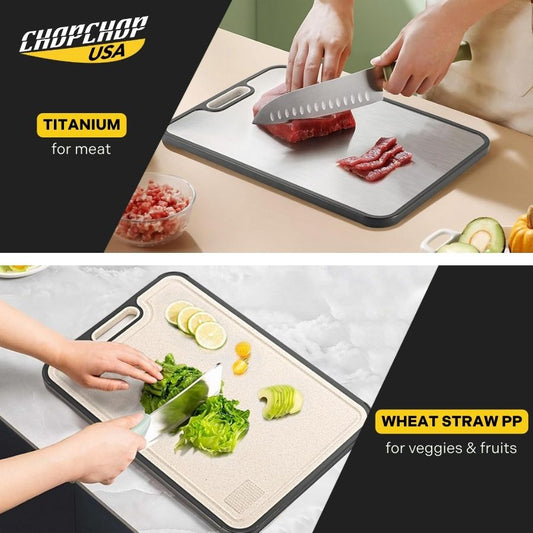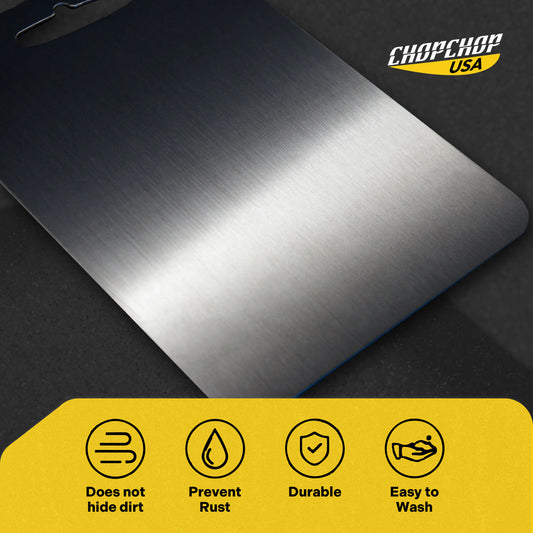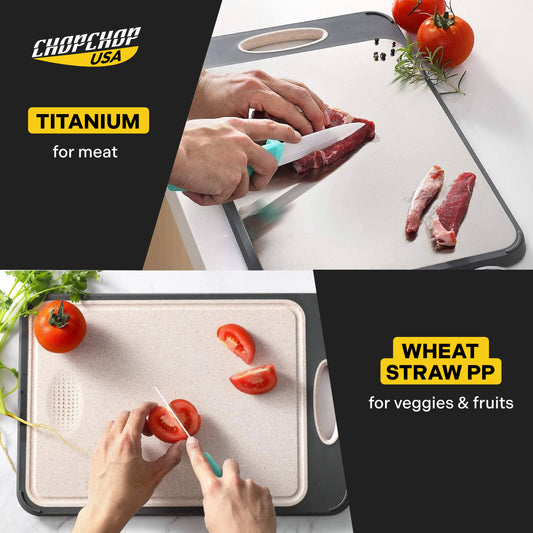Bamboo cutting boards have gained popularity among home cooks and professional chefs due to their durability, sustainability, and aesthetic appeal. But are they truly safe for food preparation? When choosing a cutting board, factors such as hygiene, maintenance, and impact on knives should be considered.
This article will provide an in-depth analysis of bamboo cutting boards, their safety, advantages, and disadvantages compared to other materials. Additionally, ChopChop USA will offer tips on proper care to extend their lifespan while keeping your kitchen safe and hygienic.
What is a Bamboo Cutting Board?

A bamboo cutting board is a kitchen accessory made from bamboo grass fibers that are bonded together with food-safe adhesives. Unlike traditional wooden cutting boards, bamboo is highly renewable and eco-friendly, making it an appealing choice for environmentally conscious consumers.
Bamboo’s natural hardness makes it resistant to knife marks and bacteria buildup, which enhances hygiene. Available in various sizes and styles, bamboo cutting boards are designed to suit different kitchen needs, from chopping vegetables to carving meats. Their lightweight design and moisture resistance make them a convenient option for everyday use.
The Growing Popularity of Bamboo Cutting Boards in Modern Kitchens
The demand for bamboo cutting boards has surged due to their sustainable properties and long-lasting performance. With more people opting for eco-friendly kitchen tools, bamboo has become a preferred alternative to traditional wooden and plastic cutting boards.
Chefs appreciate its resistance to moisture and bacterial growth, while home cooks love its stylish, natural finish. Additionally, bamboo cutting boards are lightweight and easy to maintain, making them ideal for busy kitchens. Their affordability also makes them accessible to a wide range of consumers, further contributing to their rising popularity.
Is a Bamboo Cutting Board Safe?

Yes, bamboo cutting boards are generally safe for food preparation, but their safety depends on several factors, including maintenance, usage, and quality. Let’s explore the key considerations:
Antibacterial Properties
Bamboo has natural antibacterial properties that help prevent microbial growth. Unlike plastic cutting boards that can harbor bacteria in deep knife grooves, bamboo's hard surface minimizes such risks.
However, proper cleaning is still essential to ensure food safety. If you're wondering, "is a bamboo cutting board safe?" the answer depends on how well it is maintained and cleaned.
Knife Friendliness
While bamboo is harder than traditional wood, excessive use can dull knife blades faster. Using high-quality knives and maintaining them properly can help mitigate this issue. To maximize bamboo cutting board safety, avoid using extremely sharp knives that may wear down faster.
Absorption & Stain Resistance
Bamboo is less porous than many hardwoods, making it more resistant to moisture and staining. However, prolonged exposure to water can cause warping, so it’s best to dry bamboo cutting boards immediately after washing. Proper maintenance is crucial for bamboo cutting board safety and longevity.
Chemical-Free & Food-Safe Adhesives
High-quality bamboo cutting boards are made with non-toxic adhesives and finishes. When purchasing a bamboo cutting board, look for certifications indicating that no harmful chemicals or formaldehyde were used in manufacturing.
Proper Maintenance for Safety
To maintain hygiene and extend the lifespan of a bamboo cutting board, regular cleaning and oiling with food-grade mineral oil are necessary. Avoid soaking it in water or placing it in a dishwasher, as this can cause splitting or warping. Adhering to proper care guidelines ensures bamboo cutting board safety and keeps your kitchen free from contaminants.
By following these best practices, you can confidently answer the question, "Is a bamboo cutting board safe?" with a resounding yes, as long as proper maintenance is upheld. Keeping bamboo cutting board safety in mind will help you enjoy the benefits of this eco-friendly kitchen essential for years to come.
Is a Bamboo Cutting Board Good?

Is a Bamboo Cutting Board Good? Yes! A bamboo cutting board is a great option for many kitchens due to its durability, eco-friendliness, and natural antibacterial properties. Here are some key benefits:
- Sustainable & Eco-Friendly – Bamboo grows quickly, making it a more renewable resource than traditional wood cutting boards.
- Durable & Lightweight – Bamboo is harder than most woods, meaning it resists knife marks and warping while remaining easy to handle.
- Naturally Antibacterial – Bamboo has antimicrobial properties that help reduce bacterial growth compared to plastic cutting boards.
- Less Porous – It absorbs less moisture than wood, making it more resistant to stains and odors.
- Gentle on Knives – While slightly harder than wood, bamboo is still softer than glass or metal, helping to protect knife edges.
Is a Bamboo Cutting Board Dishwasher Safe?

No, bamboo cutting boards should not be washed in the dishwasher. The high heat and prolonged exposure to water can weaken the fibers, leading to cracking, warping, or splitting. Instead, wash your bamboo cutting board by hand with mild soap and warm water, then dry it immediately with a clean towel. Periodic oiling will help maintain its integrity and extend its lifespan.
Pros & Cons of Bamboo Cutting Boards
Pros:
- Eco-friendly and sustainable
- Hard surface resistant to scratches
- Less porous, reducing bacterial buildup
- Lightweight and easy to handle
- Affordable compared to hardwood options
Cons:
- Can dull knives faster due to hardness
- Requires regular maintenance with oiling
- Not dishwasher safe
- May crack or warp if exposed to excess moisture
How to Care for a Bamboo Cutting Board

How To Clean A Cutting Board Properly? A bamboo cutting board is a durable and eco-friendly kitchen essential that, with proper care, can last for years. Unlike traditional wood boards, bamboo is naturally antibacterial and resistant to moisture. However, regular maintenance is crucial to keep it in top condition. Follow these steps to ensure your bamboo cutting board remains clean, smooth, and free of damage.
1. Clean After Each Use
After using your bamboo cutting board, wash it immediately to prevent food particles and bacteria from settling in.
- Use warm, soapy water and a soft sponge or cloth.
- Avoid submerging it in water or placing it in the dishwasher, as excessive moisture can cause warping or cracking.
- Rinse thoroughly and wipe dry with a clean towel.
2. Disinfect Naturally
To keep your cutting board sanitary, disinfect it naturally with everyday household ingredients:
- White vinegar: Wipe the board with a solution of equal parts vinegar and water.
- Lemon and salt: Sprinkle coarse salt on the board and scrub with half a lemon to remove stains and odors.
- Baking soda paste: Mix baking soda with water to form a paste and scrub gently for deep cleaning.
3. Oil Regularly
Bamboo cutting boards need conditioning to prevent drying and cracking.
- Use food-grade mineral oil, coconut oil, or beeswax.
- Apply a generous amount to the board’s surface and let it absorb overnight.
- Wipe off excess oil with a clean cloth.
- Repeat this process at least once a month or more frequently in dry climates.
4. Avoid Excess Moisture and Heat
- Never leave the board soaking in water.
- Keep it away from direct heat sources like stoves and dishwashers.
- Store it in a dry area with proper ventilation to prevent mold growth.
5. Remove Stains and Odors
- Sprinkle baking soda or salt on stubborn stains and scrub gently with a damp cloth.
- Rub the surface with lemon juice to neutralize odors.
- Let the board air dry completely before storing.
6. Store Properly
- Keep the board upright in a dry, ventilated space.
- Avoid stacking wet boards to prevent trapped moisture and mold growth.
Bamboo vs. Other Cutting Board Materials – Which is Best?
When comparing bamboo to other cutting board materials, each has its own advantages:
- Bamboo vs. Wood: Bamboo is more sustainable and less porous than wood but is harder on knives.
- Bamboo vs. Plastic: Bamboo is eco-friendly and naturally antibacterial, while plastic can harbor bacteria in deep cuts.
- Bamboo vs. Glass: Bamboo is more knife-friendly, whereas glass cutting boards can quickly dull knife blades. Overall, bamboo offers an excellent balance of durability, hygiene, and sustainability, making it a top choice for many kitchens.
- Bamboo vs. Titanium: Bamboo is lightweight and sustainable, but titanium cutting boards are ultra-hygienic, corrosion-resistant, and non-porous. Titanium doesn’t absorb stains or odors, making it a more durable and sanitary option.
- Bamboo vs. Stainless Steel: Bamboo is gentler on knives, while stainless steel offers maximum durability, rust resistance, and effortless sanitation. Stainless steel cutting boards are ideal for heavy-duty kitchen tasks but can be heavier and less knife-friendly.
Is a Bamboo Cutting Board Good? Yes, it is an excellent choice for home cooks looking for a sustainable, durable, and naturally antibacterial cutting surface. However, if you prefer a more hygienic, stain-resistant, and long-lasting option, titanium or stainless steel cutting boards will be better options.
Best Bamboo Board Brands in the Market

Choosing the right bamboo cutting board brand ensures durability, sustainability, and high performance in the kitchen. The best brands offer well-crafted boards made from premium bamboo, providing a smooth surface for chopping and slicing while being gentle on knives. Here are some of the top-rated bamboo cutting board brands available today.
Totally Bamboo
This brand is known for its premium bamboo cutting boards that combine durability with an elegant design. Their boards are crafted from high-quality Moso bamboo, ensuring sustainability and longevity. With a variety of sizes and styles, Totally Bamboo products cater to all kitchen needs, from chopping small ingredients to carving meats.
Greener Chef
Greener Chef specializes in 100% organic bamboo cutting boards that are free from toxic adhesives and coatings. Their boards are extra thick and durable, designed for heavy-duty kitchen tasks. The company focuses on sustainability, offering eco-friendly packaging and responsibly sourced materials.
Royal Craft Wood
This brand offers versatile bamboo cutting boards with built-in juice grooves and deep handles for convenience. Their boards are designed for both cutting and serving, making them a stylish and practical addition to any kitchen. Royal Craft Wood emphasizes sustainability and premium craftsmanship.
Farberware Bamboo Cutting Board
A budget-friendly option that doesn’t compromise on quality. Farberware's bamboo boards are lightweight, durable, and ideal for everyday use. They are available in sets or individual pieces, making them a great choice for home cooks seeking affordability and function.
Ziruma Bamboo Cutting Board
Ziruma creates hand-finished, toxin-free bamboo cutting boards with a sleek design. Their boards are crafted from organically grown bamboo and finished with food-safe oil to enhance durability. With a focus on aesthetics and functionality, Ziruma offers a premium experience for kitchen enthusiasts.
You can also buy a titanium cutting board or stainless steel cutting board designed by ChopChop USA. These cutting boards offer additional benefits compared to bamboo, such as enhanced durability, non-porous surfaces that resist bacteria buildup, and resistance to stains and odors.

Titanium cutting boards are lightweight, antibacterial, and highly resistant to corrosion, making them ideal for hygiene-conscious kitchens. Stainless steel cutting boards provide exceptional strength, withstand heavy-duty use, and are easy to sanitize, making them perfect for professional chefs and food preparation areas requiring the highest cleanliness standards.
While bamboo cutting boards are gentle on knives and provide a natural aesthetic, titanium and stainless steel options offer superior longevity, hygiene, and ease of maintenance.
Conclusion
Bamboo cutting boards are a fantastic addition to any kitchen, offering sustainability, durability, and hygiene benefits. While they require proper maintenance to ensure longevity, their eco-friendliness and antibacterial properties make them a popular choice. If you're looking for a cutting board that balances aesthetics, functionality, and sustainability, a bamboo cutting board is a solid investment. Just remember to care for it properly, and it will serve you well for years to come.
For more amazing recipes, follow me on Facebook and Instagram! If you have any questions about ChopChop USA's products or promotions, please feel free to contact us at support@chopchopusa.com. Our dedicated team is available 24/7 and always happy to assist you.

